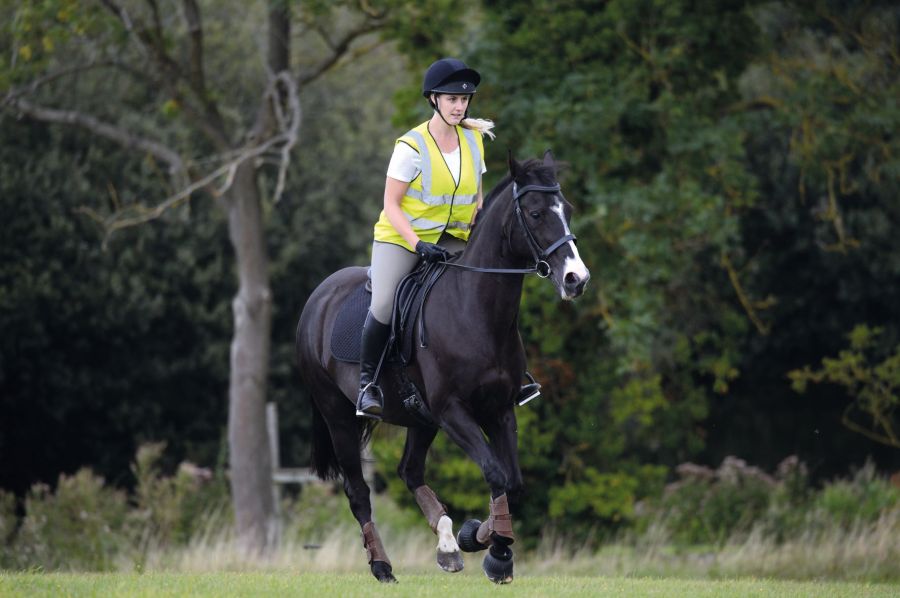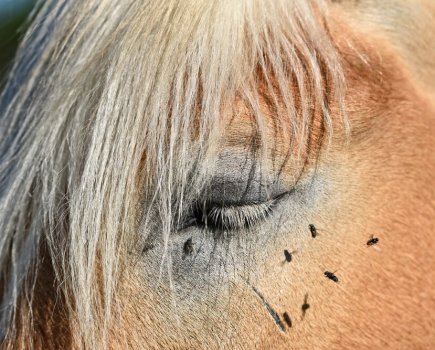Every horse is an individual, and what upsets one horse may not bother another. Knowing your horse and being able to identify what upsets and stresses them out is a good starting point to keeping them happy.
Stress in horses can manifest in many different ways, some of which are perceived as undesirable behaviour, such as being fresh and sharp to ride. However, a stressed horse can also develop stereotypies (‘vices’) — for example box walking, wind sucking or crib-biting — to help them cope.
Feeling stressed
Spend a minute thinking about how you feel when you’re stressed. You might become agitated, feel frustrated or unable to sit quietly for any length of time.
Maybe you become snappy, argumentative or want to throw an object against a wall. Everyone reacts to stress differently, and the same is true of a stressed horse.
Stress in horses can show as changes in their normal behaviour. A horse who is usually willing to be caught suddenly becoming difficult to catch, for example.
At the other end of the scale, a horse who has been suffering from stress continuously may no longer be active and alert. Instead, they become dull and depressed.
Two types of stress in horses
There are two types of stress in horses: acute (in the moment or out of character for your horse) and chronic (where a horse is constantly worried).
Each type causes the release of chemicals that will affect your horse’s behaviour.
Signs of acute stress in horses
- Nipping
- Tail swishing
- Difficult to catch
- High head and neck position
- Ears pricked tightly forward
- Worried expression
- Tension when ridden
- Staring intensely
- Poor concentration
- Clamping tail
- Fidgeting
Signs of chronic stress in horses
- Dull and depressed (lethargy)
- Uncooperative when handled and ridden
- Aggressive/irritable
- Stereotypies (‘vices’) such as wind sucking, crib-biting, weaving and box walking
- Poor learning capacity
- Over reactive
- Becoming a picky eater
- Weight loss
- Symptoms of pain
These changes are all vital clues to a stressed horse as they show that something’s wrong. The key is to know your horse well enough to recognise any early changes before problems escalate.
Stressed horse: the four ‘Fs’ they do in response
Behaviours like napping, barging, biting, rearing, bolting or being anxious are often described as “bad”. However, horses can’t talk and so they can only communicate with us is through their behaviour and body language.
Chances are, they will have been showing subtle signs of stress long before it got to “bad” behaviour stage. This is why it’s vital to read the subtle cues our horses display so we can keep them mentally and physically healthy and ourselves safe.
Horses in the wild are highly tuned to signs of danger or stress for the herd and they’ll do one of four things (or a combination of several) in response:
- Flight
Fleeing from danger is a horse’s preferred option. In our horses, this may manifest itself as bolting or trying to escape a situation. - Freeze
Planting or refusing to go forwards if nervous or frightened. We often see this when loading horses onto a trailer or lorry. - Fight
If a horse is cornered, or has learned previously that this strategy works. - Fidget
If a horse can’t escape they may fidget. This is also known as a ‘displacement’ behaviour.
How to help a stressed horse
As horse owners, our job is to minimise stress in horses through good care and training, and often it’s a multitude of things that produce the best results.
BHS level four coach Stef Eardley shares the following seven tips to bring a horse’s stress back under control:
1 Give your horse an MOT
The first thing to do is ensure your horse is healthy and free from pain. Horses tend to run away from pain so misbehaving and over-reacting may be a result of injury, illness, or poorly fitting tack.
Ask your vet to give your horse a health check to ensure they are well and consider getting their teeth checked by a equine dental technician and their back assessed by a veterinary physiotherapist or qualified equine osteopath.
Also get a saddler to check the fit of your saddle. It’s worth checking that the bridle isn’t causing your horse any discomfort too, and that you are using an appropriate, well-fitting bit.
2 Assess a stressed horse’s home life
Horses are herd animals and evolved to live in a well-structured, constant group. In the wild, they spent their days grazing a variety of grasses, herbs and shrubs and moving together as a herd.
The herd gave horses safety in numbers, a feeling of security, and made them generally calmer. It’s no surprise then, that a domesticated lifestyle which is very different to this can cause stress in horses.
Despite years of domestication, some horses still prefer to live out all year with others, and sprightly horses can benefit hugely from this routine.
Not only will they be able to use up any excess energy, but it’s closer to their natural environment and so living out may help them stay calmer, be less stressed and therefore less likely to misbehave.
If your yard doesn’t offer all year round turnout, and being stabled is affecting your horse’s wellbeing, it may be worth looking at yards that do. Your priority is finding out what’s causing a stressed horse and removing the problem.
3 Consider what you’re feeding
Assess your horse’s feed ration and determine whether they are getting too much unnecessary energy from feed, as this can cause stress in horses.
The horse’s gut works best on a constant trickle of high fibre material, so whether’s they are a family pony or a competition horse, the bulk of their diet should be based on fibre.
Fibre can be fed in many ways, from well-soaked hay for the laminitis-prone, to alfalfa for powering the performance horse.
So rather than simply adding concentrates, choose the right type of fibre for your horse. Topping up the fibre with oil, which is a great form of slow-release energy, is less likely to cause bursts of explosive energy that you may see with concentrates.
Weigh your horse often to ensure you are giving the correct amount of feed for their size too.
4. Exercise a stressed horse more
Very importantly, make sure your horse is getting enough exercise, whether that is turnout, ridden exercise or simply going on the horse walker for an hour.
A mixture of turnout and ridden work is ideal. If you struggle to find the time to ride every day, consider a sharer who can ride on the days you can’t.
5. Gain your horse’s respect
If your horse is difficult to lead out from the stable or doesn’t think twice about walking all over you, their behaviour will only be exacerbated when they are feeling fresh and/or stressed, so re-evaluate how you handle them.
The most important thing on the ground is that your horse respects your space, so when leading, make sure they are not on top of you, otherwise, you risk getting hurt if they leap about.
6. Feed for a healthy gut
It’s often said that a settled gut results in a settled horse. If your horse is the type prone to becoming ‘tucked up’ and doesn’t keep weight on easily, or they are prone to gastric ulcers, then look for specific dietary support to calm their digestive system, such as probiotic yeast, and for the ulcer-prone horse, antacids.
7. Consider using a calmer
There are plenty of calming products on the market, some backed by research into why they are said to help a stressed horse. Feeding a calmer in the run-up to or during a stressful situation may also help to take the edge off and encourage your horse to think rationally.








